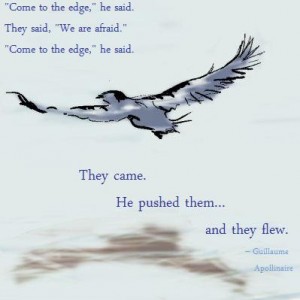Many writers fall into the trap of writing as they speak. For 99.943999876984% of us (I rounded it off), this is a bad idea. Why? Just listen to a conversation. I mean really listen.
How disjointed is it? How often do the speakers pause not as a function of proper English, but to gather their thoughts? When they resume, how often do they repeat themselves, drift down another track, or cut the logical thread completely? How many four-letter words do they use? How often do they toss in one of the worst four-letter words of all time: “like?”
Listen to anyone under the age of twenty-five, and you’ll likely hear them throwing around the L-bomb like monkeys in a poop fight. Many people toss in a “you know” every eight words or so, just to make sure that… well, you know. Lazy “fillers” function as bookmarks in speech—we save our spot so that, once our brains catch up with our mouths, we can pick up where we left off. Even then, we often get it “wrong” from a grammatical perspective—some of us more than others.
We also tend to speak in a tight, limited vocabulary—one that belies our knowledge of the language. We rarely stretch ourselves as speakers, yet we must stretch ourselves as writers. We must also not rely, as we do when speaking, on what I call the “3 R’s” of wordiness: rambling, repetition and redundancy.
A strong narrative is a tight narrative. Do not confuse lazy, meandering construction with a conversational style. Keeping it simple is fine… right up until you oversimplify.
This is just a primer for a couple of future posts (not a lot of time today), but I want to set the table because I’ve been seeing a bunch of—and I mean a TON of—wordy construction in my reading material lately.
Even seasoned pros have been guilty. Why? Are their editors afraid of offending their cash cows? Are the publishers taking too much for granted with respect to their superstar authors? I’m an editor, but I’m also a writer, and as a writer, I would want my editors to catch those pesky problems that slip past me. Otherwise, what’s the point of having an editor?
I’ll end for now with this one big hint: If you have a sentence structured like the one below (good grief, I’ve been seeing this a lot), tighten it up. Please.
There was an editor that missed many of the author’s wordy sentences.
Preferred: The author’s editor missed many wordy sentences.
I dropped it from 12 words to 7—a reduction of 42% in a single sentence. Your “TRIGGERS” (search your manuscript for these) are the following phrases: there was, there were, I/he/she/it was, they were. I’ll bet you a quarter to your nickel that a good number of those appear in wordy sentences just begging you to take a scalpel to them. Those that don’t are likely weak and blasé, screaming out for a stronger, evocative verb.
‘Til next time, and as always, remember: To write well, you must work hard. To succeed in this tough gig, you mustn’t be lazy (or discouraged).
And don’t miss these follow-up articles:
Wordiness Is Not a Style – Part 2
Wordiness Is Not a Style – Part 3
———-




I think certain cash-cow authors are granted exemption from editors simply because anything they write turns to gold. Anne Rice is one who doesn’t use an editor anymore, and I think her work would benefit greatly from it. But she has commented on her Facebook page how she couldn’t imagine being told by someone to cut parts of her work or to change anything she’s written.
When I read “The Witching Hour,” I earmarked 115 pages of repetitive prose I didn’t need. Much of the book was repetitive, with so many characters with no role in the story that my eyes glassed over at times. Though she talked about the power of the witches she mentioned, I never saw the power. A good editor would have picked up on this and said something. Many readers lament Rice’s lack of an editor, stating that her work would have benefitted from a critical eye.
I’ve had parts of my books with editorial suggestions to cut or revise, and I took most all of that advice to heart and made the changes. When revising one of my novellas, I cut four pages of useless, trivial words, creating a tighter and cleaner read.
All authors, regardless how lucrative they may be, should have an editor no matter what.
Agreed. I can’t imagine not having an editor review my work. We all have blind spots. Sounds like the only thing bigger than Anne Rice’s blind spots is her ego.
I actually encountered similar problems with authors like James Patterson, John Sandford, and Kathy Reichs. Is was plain as day when they stopped getting good editorial assistance. Sad, really.